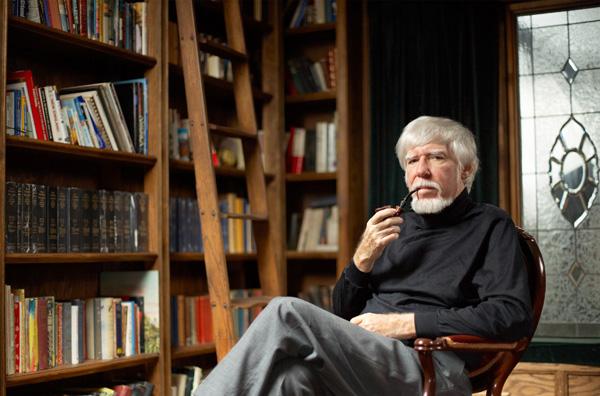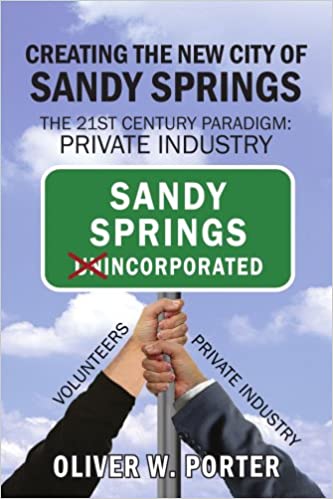Oliver Porter is a key co-founder of the City of Sandy Springs. The engineer and artist was a volunteer on organizing committees for the formation of the city in 2005, then served as the first interim city manager.
He was the architect of the City’s once famous status as an almost entirely outsourced government that used private contracts to run most departments besides police and firefighting. Known as the “public-private partnership,” the outsourcing model was a necessity in starting up a city government on the short deadline provided by the state legislature. But the City kept the model in place long-term, believing it would keep costs down and make government more efficient.
The model made Sandy Springs famous and many of the cities that formed in its wake — such as Brookhaven, Dunwoody and Johns Creek — adopted some form of the privatized model. Porter became a guru of municipal privatization and wrote a book about the local experience, “Creating the New City of Sandy Springs: The 21st Century Paradigm: Private Industry.”
However, most other cities stepped back from such extreme privatization, and in 2019, Sandy Springs did, too. The City abruptly pulled almost all departments in-house, citing higher costs and lack of control over salaries, among other issues. Porter largely avoids comment about the issue, saying he defers to current leaders and that the telling sign will be if tax rates increase.
However, Porter remains active in cityhood movements. He is the co-founder and council member for Próspera, an independent, privatized city that began operations last year on the island of Roatán in Honduras. And he recently became a paid advisor to the controversial movement for the Atlanta neighborhood of Buckhead to leave and become its own city.
Meanwhile, Porter continues to live in Sandy Springs, as he had for decades. We asked him about the history of cityhood and local life.
Why was the cityhood movement important to you?
When I became involved with the Committee for Sandy Springs, it was obvious that Fulton County was not serving the best interests of our citizenry. We were paying a disproportionate share of the taxes and were not receiving a proportional share of the services. Of most concern was the county’s zoning policies that were allowing development that was not in the best interest of our community. There were many other concerns, such as a lack of police and fire protection, traffic problems and the scarcity of parks that disturbed our residents. The more I became aware of the poor treatment of our community, the more I became convinced that incorporation was the only answer.
Why was the public-private partnership model important to starting and running the city?
The contract model was the only way that I could actually start the city, given the constraints of the legislature that had passed. We had no time, and no authority, to create a typical bureaucratic government. By convincing private companies to put up the funds, manpower, equipment buildings, et cetera to start the city without a contract, we were able to have a fully functioning, efficient city on Day One. This model proved to be an excellent method for running the city’s services for over 10 years. Services were improved across the board and there were no increases in tax rates. A surplus of about $45 million was accrued and the new city had no long-term liabilities nor unfunded pensions.
What do you like best about living in Sandy Springs?
I have lived in metro Atlanta four times, finally settling in Sandy Springs for the past 40 years. Our neighborhood is pleasant, safe and values have increased. Becoming a city with more ability to control our future has been a big plus.
Any other thoughts about the city and its culture?
The people of Sandy Springs showed a great deal of intelligence and initiative in seeking to become the first new city in Georgia in 50 years. Their leadership has been a model for nine other new cities to form in the metro area, and in fact, has inspired significant national and international interest in the public-private partnership model that we created.
Sandy Springs is a rather “laid-back “community that enjoys a pleasant culture and way of life. I do not intend to move until they carry me out.



